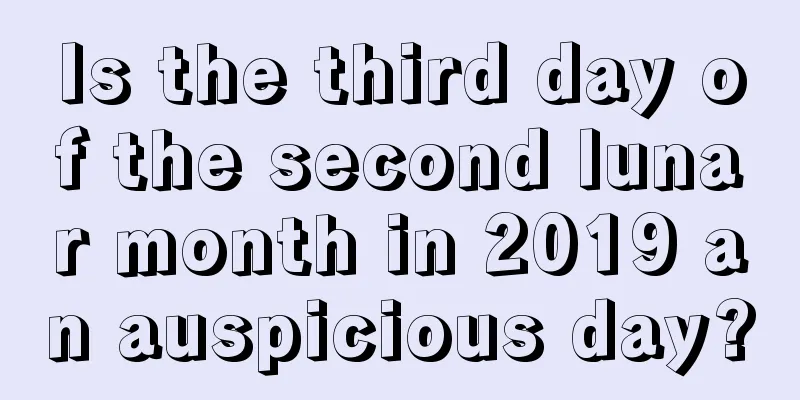What is the origin of the Spring Festival custom of staying up all night?

The Spring Festival is an ancient festival in my country and also the most important festival of the year. During the Spring Festival, there are many interesting customs and habits. Various celebrations are held across the country to welcome the arrival of the Spring Festival. The activities are rich and colorful. So what is the meaning of the Spring Festival custom of staying up all night? If you want to know more related content, please search in the 2018 Spring Festival special topic carefully compiled by the Fortune Teller website!What is the meaning of the Spring Festival custom of staying up all night?Staying up all night on New Year's Eve is a custom of staying up all night on the last day of the old year to welcome the arrival of the new year. It is also called New Year's Eve, commonly known as "staying up all night to welcome the new year." In ancient times, staying up all night to celebrate the New Year had two meanings: for the elderly, it was to "bid farewell to the old year" and to cherish time; for the young, it was to extend their parents' lives. Since the Han Dynasty, the time when the old year turns to the new year is generally midnight. On New Year’s Eve, men, women, young and old, all gather together to celebrate the coming of the New Year with bright lights on. Therefore, staying up all night to see the New Year in is one of the customs of the Spring Festival.The earliest record of staying up all night to celebrate the New Year can be found in the Western Jin Dynasty, when people would light candles or oil lamps and stay up all night. Influenced by China, Japan, Vietnam, Thailand and other Southeast Asian countries all have the custom of staying up on New Year's Eve. Staying up all night on New Year's Eve is the most important annual custom, which has been recorded as early as the Wei and Jin Dynasties. On New Year's Eve, the descendants of Yan and Huang still attach great importance to the custom of staying up all night with the whole family, drinking together and enjoying the family happiness. After the first crow of the cock, the new year begins. Men, women, old and young all wear festive attire, first pay New Year's greetings to the elders in the family, then visit relatives and friends, and congratulate and wish each other well. At this time, the land of China is shining with colors everywhere. From the first day to the fifteenth day of the lunar month, people are immersed in a festive atmosphere of joy, peace and civilization. The custom of staying up all night to welcome the New Year expresses both a sense of farewell and a desire to remember the passing years, and a hope for the coming New Year. What are the customs of staying up all night to celebrate the New Year?Stay up all night. In Fuqing, it is called "sitting thirty in the evening", which means that the whole family sits under the lamp and chats until dawn. It is not known when the custom of staying up all night to welcome the New Year began, because there is no authoritative historical record of such a thing. But there is a saying about the reason for staying up all night, it is said that on New Year's Eve all the gods in heaven come down to the earth, among them the one-legged god will go to every bed, and if he sees someone sleeping, he will spread disease to that person, so no one dares to sleep on New Year's Eve. Most children cannot stay up late, but they do not sleep in bed, but in their mother's arms. Because we have to stay up all night, although later it only needs to wait until midnight, it is still relatively long. We have to drink some tea or sugar water to refresh ourselves, and eat some fried beans, peanuts, melon seeds, etc. to pass the time. Also, because New Year's Eve is the last day of the year, it is the new year after one night. This symbolizes that the family eats from the old year to the new year, hoping that there will be food every year. Since the 1980s, staying up all night to welcome the New Year has taken on new meanings. People across the country are enjoying the cultural feast presented by CCTV - the Spring Festival Gala, to welcome the ringing of the New Year's bell.The New Year's Eve dinner starts with the New Year's Eve dinner. We sit down at the table when the lights are turned on. Some families continue to eat until late at night. According to Zong Yan's "Jingchu Sui Shi Ji", the custom of eating New Year's Eve dinner has existed at least since the Southern and Northern Dynasties. When staying up all night to see the New Year in, children will receive New Year’s money from their elders. It is said that New Year’s money can suppress evil spirits, because “岁” (year) and “祟” (sui) are homophones. The younger generation can spend a year in peace after receiving New Year’s money, which also symbolizes having money all year round. This custom began in the Song Dynasty. At that time, the New Year's money was specially made and could not be circulated in the market to buy and sell things. In ancient times, the smallest denomination coins were made of copper, so they were called copper plates or copper coins. The copper coin is round with a square hole in the middle, so scholars jokingly called the coin "Brother Kong Fang". There are words above and below the square hole on the front of the copper coin, most of which are the emperor's reign title when it was issued. There are also words on the left and right: "Tong Bao" or "Yuan Bao". The copper coins issued in the Yuan and Qing dynasties had "Mongolian" and "Manchu" characters on the back. The shape and size of lucky money are similar to copper coins, but the front and back of lucky money are mostly patterns related to growth and longevity. It was not until after the Xinhai Revolution that no one produced lucky money and paper money appeared. Only then did people use cash as lucky money and put it in red paper bags, which were called "red envelopes." Nowadays, the most popular catchphrase among children when wishing each other a prosperous new year is “Wish you great wealth and prosperity, give me the red envelope.” Why do we distribute New Year's money on New Year's Eve? What is the significance of this custom? For minors, they are one year older after New Year's Eve, and New Year's Eve is called New Year's Eve, also called Chusui. "Sui" has two meanings: one is to record the years, and the other is age. Therefore, "Yasui" means to suppress the age and bid farewell to the old year. Why do we use New Year's money that is the same shape as copper coins? Because in ancient times, the copper coins were round in shape, representing the sky, and the square hole represented the earth, the so-called "the sky is round and the earth is square." Heaven and earth are the greatest and can suppress anything. So, in today's scientifically advanced and highly civilized society, why do we still follow the custom of distributing New Year's money? Because this custom implies care for life, reminding adults and minors to cherish life and stay away from all behaviors that endanger life: drug abuse, violence, drunk driving... During the New Year , people stick yellow paper on sesame stalks and make gold ingots into a bundle, which is called a "cornucopia". Then, the whole family crushes it with their feet, using the Chinese character for broken (broken) to rhyme with the Chinese character for year (old), and borrowing the auspicious meaning of sesame seeds blooming higher and higher, to wish the family prosperity and express their blessings and hopes for the new year. Entertainment In ancient times, on New Year’s Eve, the family would get together, eat New Year’s Eve dinner, and chat happily. Some ordinary families also play Pai Gow, dice, poker, mahjong, etc. Modern Chinese people tend to watch TV programs, such as the Spring Festival Gala, as a family, waiting for the New Year to come. |
Recommend
What is the fate of people born on the thirteenth day of the first lunar month? Is fate good or bad?
People born at different times have different fort...
The fate of a baby girl born on the 17th day of the seventh lunar month in 2021
There is a certain relationship between the time a...
What are some ancient poems and proverbs about the Beginning of Autumn? What are the customs for the Beginning of Autumn in 2021?
The beginning of autumn marks the arrival of a new...
Fate of those born in Guyu, Fate of those born in the Year of Monkey in Guyu
Grain Rain is approaching and the weather is gradu...
Is it possible to get engaged on May 21st of the lunar calendar in 2022? How about getting engaged?
There are certain considerations and rules when ch...
Is it not suitable to raise the beam on the 17th day of the twelfth lunar month in 2020? Check the auspicious time on January 29, 2021
Introduction: It is also necessary to choose an au...
Can I get married on the Beginning of Autumn in 2021? Is it bad to get married in the rain at the beginning of autumn?
Getting married also requires choosing a time, so ...
What is the fate of a boy born on July 12, 2022 in the lunar calendar?
What is the fate of a boy born on July 12, 2022 in...
Is May 14th of the lunar calendar in 2021 a good day to travel? Is it suitable for travel?
In the fifth month of the lunar calendar, most par...
What festivals are there in the twelfth lunar month of 2021? What are the customs?
The festivals in different months are also differe...
What are the important points to pay attention to in agricultural production during the Grain Full solar term? What should we pay attention to in health preservation during the Grain Full solar term?
Introduction: The Grain Full solar term is one of ...
Can a married daughter return to her parents’ home during the Beginning of Winter? Analysis of the taboos of Lidong
Introduction: Our country is a typical traditional...
Is the fifth day of the first lunar month in 2021 a good date in the lunar calendar? What does the fifth day of the Spring Festival mean?
Different days have different good and bad fortune...
What activities are there during the Spring Equinox? What does the Spring Festival refer to?
Each solar term has its own traditional activities...
What to eat during the Beginning of Heat? What is the best way to maintain health during the Chushu solar term?
Introduction: Chushu is one of the 24 solar terms ...









